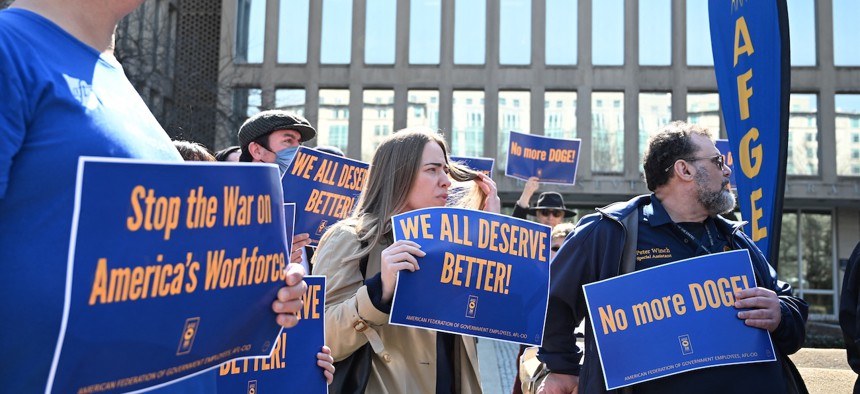
Protesters hold signs in solidarity with the American Federation of Government Employees of District 14 at a rally in support of federal workers at the Office of Personnel Management in Washington, D.C. on March 4, 2025. ALEX WROBLEWSKI/AFP via Getty Images
Labor groups: Trump’s union-busting EO amounts to ‘revenge’ for suing to block workforce cuts
Democratic lawmakers warned that assaults on civil servants and organized labor are common early steps to consolidate power by authoritarian regimes.
Labor unions—both those representing public servants and private sector guilds—on Friday lambasted President Trump’s executive order aiming to outlaw unions for two-thirds of the federal workforce under the guise of national security and vowed to defeat the measure in court.
Trump’s order, released late Thursday, cites a rarely used provision of the 1978 Civil Service Reform Act allowing the president to exclude agencies and agency subcomponents from collective bargaining rules if the rules “cannot be applied to that agency or subdivision in a manner consistent with national security requirements,” and applies it sweepingly to more than a dozen agencies.
The list of agencies impacted by the order include the Defense and Homeland Security departments, but also agencies with little to no direct involvement in national security issues, including the Federal Communications Commission, Environmental Protection Agency and even the National Science Foundation. But it exempts unions representing law enforcement and firefighters, the only unions to endorse the president ahead of last year’s election.
At a press conference on Capitol Hill Friday, union leaders and Democratic lawmakers vowed to defeat Trump’s edict in court and warned that Thursday’s news marks the latest evidence that the administration is pursuing authoritarian goals, amid attempts to deport individuals critical of U.S. policy and to undermine Congress’ power of the purse.
“The fundamental constitutional right to join a union is under attack, and it is a deadly serious issue for every American,” said Everett Kelley, national president of the American Federation of Government Employees. “Now let’s be clear: invoking national security as justification for this action is a ridiculous pretext, not a legal reason . . . It’s ridiculous to think that unions’ work wasn’t a security issue during the Cold War, during Desert Storm, during the war on terror and Trump’s first term, but now all of a sudden they are.”
“This is the biggest assault on collective bargaining rights that we have ever seen in this country,” said Randy Erwin, president of the National Federation of Federal Employees. “We’re talking about over 1 million federal workers losing their right to bargain here and it’s completely unacceptable . . . These rights don’t disappear just because the president finds them inconvenient, and that’s exactly what’s happening here.”
Rep. Jamie Raskin, D-Md., ranking member of the House Judiciary Committee and a constitutional law professor by trade, described Trump’s edict as retaliation for unions’ work in recent weeks to defend federal employees’ rights amid a government-wide effort to purge civil servants and politicize the federal workforce.
“It is a clear case of First Amendment viewpoint discrimination and political retaliation against AFGE and other unions for standing up for the rights of federal workers,” Raskin said. “They don’t have the power to breach existing collective bargaining agreements based on anti-speech discrimination, and that’s exactly what’s going on . . . You know, when right-wing coups and authoritarian takeovers happen all over the world, the first thing they do is they attack the civil service and then they attack the labor movement.”
Ron Sanders, who served as chairman of the Federal Salary Council during Trump’s first term but resigned following the president’s first attempt to implement Schedule F, the since-renamed plan to convert tens of thousands of federal workers in “policy-related” positions into at-will employees, told Government Executive in January that administration officials sought his insight on exempting employees using the CSRA’s national security exemption due to his work during the George W. Bush administration on the aborted National Security Personnel System.
In an interview Friday, Sanders described the resulting executive order as “to put it nicely, a real shot in the dark,” with little chance for success against the impending legal challenges.
“If you look at the history of the federal labor relations statute, it was part of the old Civil Service Reform Act of 1978, and it’s been around for many, many decades—and before that it was preceded by a series of executive orders, including one signed by Richard Nixon,” Sanders said. “These laws and executive orders all had this national security exclusion, and it’s A: never been used except in extreme cases, like the intelligence community workforce or parts of the law enforcement community, and B: it’s never been a problem . . . The framers of this EO are going to have to provide evidence that unions have somehow undermined national security writ large, and there’s simply no evidence of that—and to the contrary, it’s pretty clear from the framers of the law fully intended collective bargaining to be in the public interest.”
How are these changes affecting you? Share your experience with us:
Eric Katz: ekatz@govexec.com, Signal: erickatz.28
Sean Michael Newhouse: snewhouse@govexec.com, Signal: seanthenewsboy.45
Erich Wagner: ewagner@govexec.com; Signal: ewagner.47
NEXT STORY: Trump order aims to outlaw most government unions on ‘national security’ grounds







